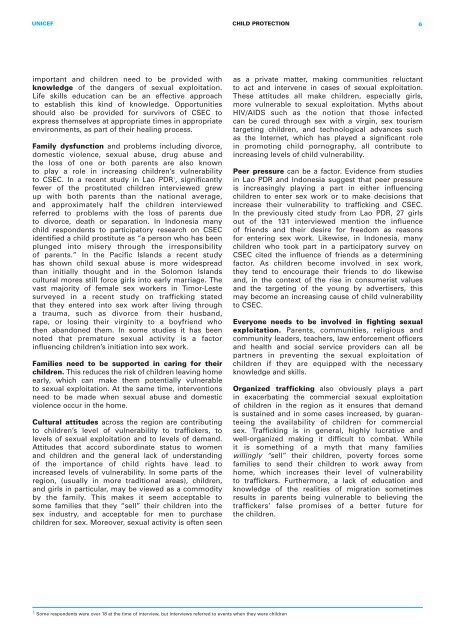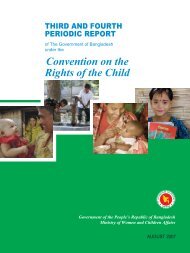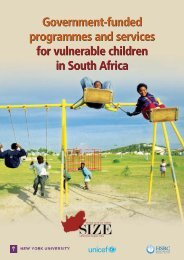CHILD PROTECTION - Unicef
CHILD PROTECTION - Unicef
CHILD PROTECTION - Unicef
You also want an ePaper? Increase the reach of your titles
YUMPU automatically turns print PDFs into web optimized ePapers that Google loves.
UNICEF<br />
<strong>CHILD</strong> <strong>PROTECTION</strong><br />
6<br />
important and children need to be provided with<br />
knowledge of the dangers of sexual exploitation.<br />
Life skills education can be an effective approach<br />
to establish this kind of knowledge. Opportunities<br />
should also be provided for survivors of CSEC to<br />
express themselves at appropriate times in appropriate<br />
environments, as part of their healing process.<br />
Family dysfunction and problems including divorce,<br />
domestic violence, sexual abuse, drug abuse and<br />
the loss of one or both parents are also known<br />
to play a role in increasing children’s vulnerability<br />
to CSEC. In a recent study in Lao PDR 1 , significantly<br />
fewer of the prostituted children interviewed grew<br />
up with both parents than the national average,<br />
and approximately half the children interviewed<br />
referred to problems with the loss of parents due<br />
to divorce, death or separation. In Indonesia many<br />
child respondents to participatory research on CSEC<br />
identified a child prostitute as “a person who has been<br />
plunged into misery through the irresponsibility<br />
of parents.” In the Pacific Islands a recent study<br />
has shown child sexual abuse is more widespread<br />
than initially thought and in the Solomon Islands<br />
cultural mores still force girls into early marriage. The<br />
vast majority of female sex workers in Timor-Leste<br />
surveyed in a recent study on trafficking stated<br />
that they entered into sex work after living through<br />
a trauma, such as divorce from their husband,<br />
rape, or losing their virginity to a boyfriend who<br />
then abandoned them. In some studies it has been<br />
noted that premature sexual activity is a factor<br />
influencing children’s initiation into sex work.<br />
Families need to be supported in caring for their<br />
children. This reduces the risk of children leaving home<br />
early, which can make them potentially vulnerable<br />
to sexual exploitation. At the same time, interventions<br />
need to be made when sexual abuse and domestic<br />
violence occur in the home.<br />
Cultural attitudes across the region are contributing<br />
to children’s level of vulnerability to traffickers, to<br />
levels of sexual exploitation and to levels of demand.<br />
Attitudes that accord subordinate status to women<br />
and children and the general lack of understanding<br />
of the importance of child rights have lead to<br />
increased levels of vulnerability. In some parts of the<br />
region, (usually in more traditional areas), children,<br />
and girls in particular, may be viewed as a commodity<br />
by the family. This makes it seem acceptable to<br />
some families that they “sell” their children into the<br />
sex industry, and acceptable for men to purchase<br />
children for sex. Moreover, sexual activity is often seen<br />
as a private matter, making communities reluctant<br />
to act and intervene in cases of sexual exploitation.<br />
These attitudes all make children, especially girls,<br />
more vulnerable to sexual exploitation. Myths about<br />
HIV/AIDS such as the notion that those infected<br />
can be cured through sex with a virgin, sex tourism<br />
targeting children, and technological advances such<br />
as the Internet, which has played a significant role<br />
in promoting child pornography, all contribute to<br />
increasing levels of child vulnerability.<br />
Peer pressure can be a factor. Evidence from studies<br />
in Lao PDR and Indonesia suggest that peer pressure<br />
is increasingly playing a part in either influencing<br />
children to enter sex work or to make decisions that<br />
increase their vulnerability to trafficking and CSEC.<br />
In the previously cited study from Lao PDR, 27 girls<br />
out of the 131 interviewed mention the influence<br />
of friends and their desire for freedom as reasons<br />
for entering sex work. Likewise, in Indonesia, many<br />
children who took part in a participatory survey on<br />
CSEC cited the influence of friends as a determining<br />
factor. As children become involved in sex work,<br />
they tend to encourage their friends to do likewise<br />
and, in the context of the rise in consumerist values<br />
and the targeting of the young by advertisers, this<br />
may become an increasing cause of child vulnerability<br />
to CSEC.<br />
Everyone needs to be involved in fighting sexual<br />
exploitation. Parents, communities, religious and<br />
community leaders, teachers, law enforcement officers<br />
and health and social service providers can all be<br />
partners in preventing the sexual exploitation of<br />
children if they are equipped with the necessary<br />
knowledge and skills.<br />
Organized trafficking also obviously plays a part<br />
in exacerbating the commercial sexual exploitation<br />
of children in the region as it ensures that demand<br />
is sustained and in some cases increased, by guaranteeing<br />
the availability of children for commercial<br />
sex. Trafficking is in general, highly lucrative and<br />
well-organized making it difficult to combat. While<br />
it is something of a myth that many families<br />
willingly “sell” their children, poverty forces some<br />
families to send their children to work away from<br />
home, which increases their level of vulnerability<br />
to traffickers. Furthermore, a lack of education and<br />
knowledge of the realities of migration sometimes<br />
results in parents being vulnerable to believing the<br />
traffickers’ false promises of a better future for<br />
the children.<br />
1 Some respondents were over 18 at the time of interview, but interviews referred to events when they were children

















